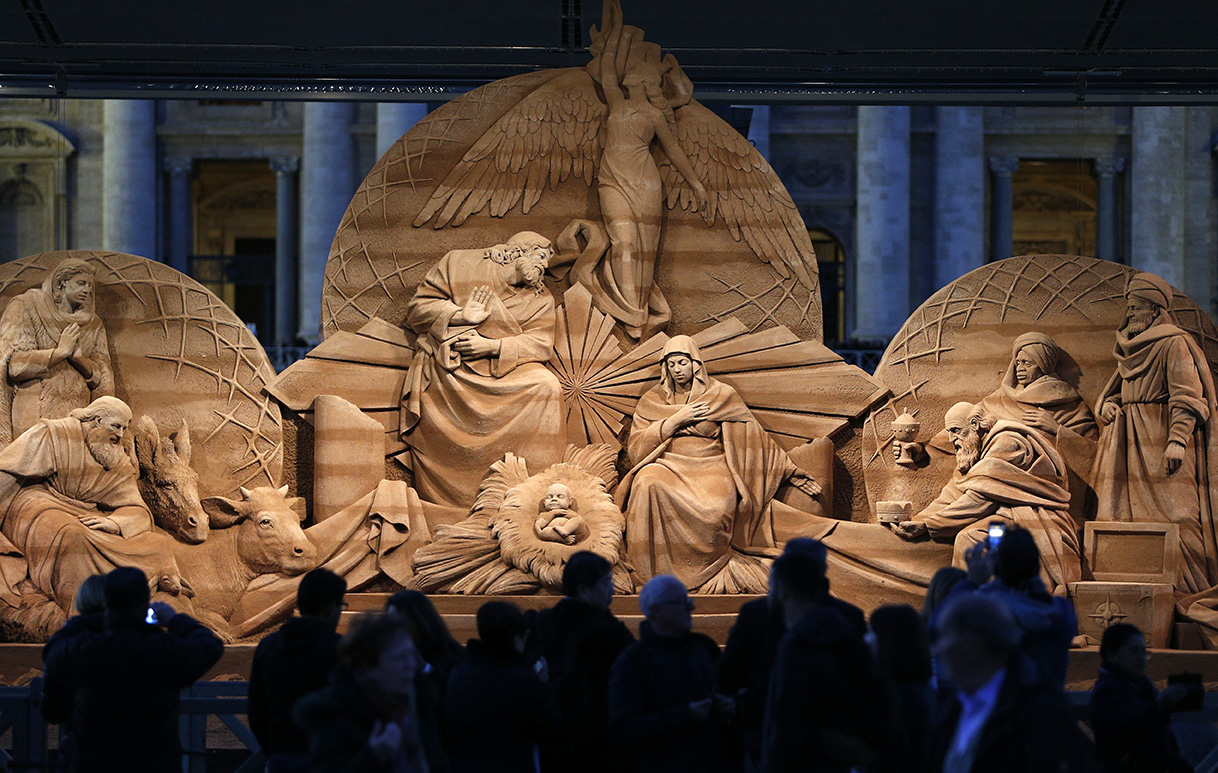“O Come, All Ye Faithful” is undoubtedly one of the most beloved Christmas carols. Whether it echoes in hearts from its use in Advent, Christmas and Epiphany liturgies, or from the dulcet tones of Bing Crosby’s crooning, the hymn brings many to tears every Christmas season.
While the exact origins of the beloved Christmas song remain debated among musicologists, there is general agreement that the hymn is associated with John Francis Wade. Living in exile among English Catholics who fled to France, the hymn is traced back to a collection of chants published by Wade in 1751.
“O Come, All Ye Faithful” is fundamentally about Christ, calling the faithful forward to joyfully worship him. And the refrain sings of that highest act of worship reserved for God alone: adoration. Venite adoremus, O Come let us adore him, we sing each Christmas.
For Catholics, the natural center of our adoration is our eucharistic devotion. As such, the hymn prompts a question this Christmas season, the first in which we are celebrating a National Eucharistic Revival: What if, on Christmas Eve, each parish were to offer Eucharistic adoration before one of the Christmas Masses? What if, as we welcome the Prince of Peace into our hearts, we were to offer a taste of the peace that can come from spending time with Christ, our eucharistic Lord?
Quite reasonably, some will immediately object: Christmas brings many of our brothers and sisters to Mass who don’t usually come. If they don’t come to Sunday Mass, why would they recognize the exposed Eucharist in a monstrance? Is this the best way to reach out to engage disenfranchised Catholics?
The editorial board of Our Sunday Visitor replies with a resounding and certain yes. Our brothers and sisters don’t want gimmicks. They don’t want programs or productions.
The world is replete with distraction and entertainment. They need something different, something that will pierce their hearts. They need the richness of our Catholic tradition. They need the roots of our ancient faith. But more importantly still, like all of us, they need Christ himself.
If parishes decide to go this route, steps must be taken, of course, to prioritize a warm reception of our brothers and sisters who perhaps have been absent from Mass for years in the wake of the COVID-19 pandemic.
Greeters should be well trained to offer friendly words of welcome, to show people to a pew, to demonstrate reverence before the Blessed Sacrament and to offer invitations to upcoming events. Information with prayers and explanations of eucharistic adoration should be distributed as people enter the church.
The sanctuary itself should be staged for prayer. To counter the typical chaos before a large Christmas Eve Mass, pastors could consider playing gentle background music. The church’s lights could be dimmed during exposition and not fully illuminated until Christmas Mass begins.
A guided meditation could be led to help people pray before the Blessed Sacrament in order to really accompany those for whom such prayer is unfamiliar. The prayers of Benediction might well collect hearts and minds and help the faithful enter more deeply into the Christmas liturgy.
In terms of preparation, announcements could be made in the weeks preceding Christmas to encourage parishioners to be actively hospitable and inviting before Mass. In particular, efforts should be made to accommodate young families, who so often report feeling unwelcome by older parishioners.
If it’s a success, it could be just the beginning. Eucharistic adoration could be introduced beyond the Masses of Christmas Eve or Christmas Day. Periods of eucharistic adoration could be offered before or after Masses throughout the Christmas season, as a way to introduce the faithful to this beautiful devotion.
Every Christmas is an opportunity to return to Bethlehem, to approach the God who took human flesh. In doing so he became very close to us, even “like us in all things but sin.” In the Eucharist, he remains near to us, present in every tabernacle in every Catholic Church throughout the world.
This Christmas as we continue to revive eucharistic devotion in our country, we should take the opportunity to help our fellow Catholics to see more clearly that the infant King born for our salvation on that holy night remains present with us, hidden under the guise of bread. O come, let us adore him!







